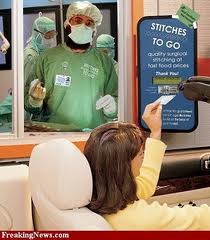 Being an expert clinician requires mastery of an immense body of knowledge, aptitude in physical examination and differential diagnosis, and an ability to assimilate all information about a patient in order to institute the most appropriate and effective treatment.
Being an expert clinician requires mastery of an immense body of knowledge, aptitude in physical examination and differential diagnosis, and an ability to assimilate all information about a patient in order to institute the most appropriate and effective treatment.
Unfortunately, in many practice settings these days, such expertise is not highly valued. In fact, these age-old skills are being shoved to the side in favor of more expedient, “checklist”-type medicine, often done by non-skilled providers or in a hurried fashion. If the “ideal” doctor’s visit is a four-course meal at a highly rated restaurant, today’s medical appointments are more like dining at the Olive Garden, if not McDonald’s or Burger King.
At the rate we’re going, it’s only a matter of time before medical care becomes available for take-out or delivery. Instead of a comprehensive evaluation, your visit may be an online questionnaire followed by the shipment of your medications directly to your door.
Well, that time is now. Enter “Virtuwell.”
The Virtuwell web site describes itself as “the simplest and most convenient way to solve the most common medical conditions that can get in the way of your busy life.” It is, quite simply, an online site where (for the low cost of $40) you can answer a few questions about your symptoms and get a “customized Treatment Plan” reviewed and written by a nurse practitioner. If necessary, you’ll also get a prescription written to your pharmacy. No appointments, no waiting, no insurance hassles. And no embarrassing hospital gowns.
 As you might expect, some doctors are upset at what they perceive as a travesty of our profession. (For example, some comments posted on an online discussion group for MDs: “the public will have to learn the hard way that you get what you pay for”; “they have no idea what they don’t know—order a bunch of tests and antibiotics and call it ‘treated'”; and “I think this is horrible and totally undermines our profession.”) But then again, isn’t this what we have been doing for quite a while already? Isn’t this what a lot of medicine has become, with retail clinics, “doc-in-a-box” offices in major shopping centers, urgent-care walk-in sites, 15-minute office visits, and managed care?
As you might expect, some doctors are upset at what they perceive as a travesty of our profession. (For example, some comments posted on an online discussion group for MDs: “the public will have to learn the hard way that you get what you pay for”; “they have no idea what they don’t know—order a bunch of tests and antibiotics and call it ‘treated'”; and “I think this is horrible and totally undermines our profession.”) But then again, isn’t this what we have been doing for quite a while already? Isn’t this what a lot of medicine has become, with retail clinics, “doc-in-a-box” offices in major shopping centers, urgent-care walk-in sites, 15-minute office visits, and managed care?
When I worked in community mental health, I know that some of my fellow MDs saw 30-40 patients per day, and their interviews may just as well have been done over the telephone or online. It wasn’t ideal, but most patients did just fine, and few complained about it. (Well, if they did, their complaints carried very little weight, sadly.) Maybe it’s true that much of what we do does not require 8+ years of specialty education and the immense knowledge that most physicians possess, and many conditions are fairly easy to treat. Virtuwell is simply capitalizing on that reality.
 With the advent of social media, the internet, and services like Virtuwell, the role of the doctor will further be called into question, and new ways of delivering medical care will develop. For example, this week also saw the introduction of the “Skin Scan,” an iPhone app which allows you to follow the growth of your moles and uses a “proprietary algorithm” to determine whether they’re malignant. Good idea? If it saves you from a diagnosis of melanoma, I think the answer is yes.
With the advent of social media, the internet, and services like Virtuwell, the role of the doctor will further be called into question, and new ways of delivering medical care will develop. For example, this week also saw the introduction of the “Skin Scan,” an iPhone app which allows you to follow the growth of your moles and uses a “proprietary algorithm” to determine whether they’re malignant. Good idea? If it saves you from a diagnosis of melanoma, I think the answer is yes.
In psychiatry—a specialty in which treatment decisions are largely based on what the patient says, rather than a physical exam finding—the implications of web-based “office visits” are particularly significant. It’s not too much of a stretch to envision an HMO providing online evaluations for patients with straightforward complaints of depression or anxiety or ADHD-like symptoms, or even a pharmaceutical company selling its drugs directly to patients based on an online “mood questionnaire.” Sure, there might be some issues with state Medical Boards or the DEA, but nothing that a little political pressure couldn’t fix. Would this represent a decline in patient care, or would it simply be business as usual? Perhaps it would backfire, and prove that a face-to-face visit with a psychiatrist is a vital ingredient in the mental well-being of our patients. Or it might demonstrate that we simply get in the way.
 These are questions we must consider for the future of this field, as in all of medicine. One might argue that psychiatry is particularly well positioned to adapt to these changes in health care delivery systems, since so many of the conditions we treat are influenced and defined (for better or for worse) by the very cultural and societal trends that lead our patients to seek help in these new ways.
These are questions we must consider for the future of this field, as in all of medicine. One might argue that psychiatry is particularly well positioned to adapt to these changes in health care delivery systems, since so many of the conditions we treat are influenced and defined (for better or for worse) by the very cultural and societal trends that lead our patients to seek help in these new ways.
The bottom line is, we can’t just stubbornly stand by outdated notions of psychiatric care (or, for that matter, by our notions of “disease” and “treatment”), because cultural influences are already changing what it means to be healthy or sick, and the ways in which our patients get better. To stay relevant, we need to embrace sites like Virtuwell, and use these new technologies when we can. When we cannot, we must demonstrate why, and prove how we can do better.
[Credit goes to Neuroskeptic for the computer-screen psychiatrist. Classic!]

1 April 2011
Dubuque, Iowa
Health Insurance Times
Health industry group: Replace psychiatrists with vending machines
Measure to reduce health care costs
1 April 2011 (Dubuque, Iowa) A health care industry thinktank, US Health Insurance Consortium on Cost, advocates replacing psychiatrists and other doctors with vending machines to prescribe and dispense antidepressants.
“We believe this will cut the cost of psychiatric services significantly,” Uli Arnowsky, spokesperson for USHICost, said. “Our studies show the diagnosis and prescription process can be automated, with no loss in quality of care. Specialist costs are just not necessary for this type of treatment, and psychiatrists are overworked anyway.”
USHICost’s plan is to make the Psychiatric Diagnostic Screening Questionnaire (PDSQ) available online to health plan members. Answers would be captured in a database and analyzed to produce a recommendation for a prescription. A psychiatric nurse reviews the recommendations and authorizes the prescription, which is then attached to the patient’s database record.
Vending machines, in convenient medical center locations and on a secure network, would be stocked with the most common generic antidepressants.
“We prefer the generics,” Arnowsky said. “They’re part of the cost-cutting. Our studies show they’re just as effective as the name-brand drugs.”
According to Arnowsky, to get a prescription filled, a patient would input a health plan ID and a password at a vending machine. The machine would look in the database, dispense the authorized prescription, and charge the copay to a credit card on file in the patient’s health plan record.
“We really like the way this system keeps electronic medical records, too,” Aronowsky said. “It’s a win-win-win for all concerned.”
Patients reporting side effects would be advised to see their doctors, who could then adjust the prescription if needed.
“There’s a lot of trial and error in prescribing antidepressants already,” he said. “This system is no more error-prone than present prescribing practices. In fact, we put fuzzy logic in the system to rotate prescriptions among the antidepressants, because we’ve found doctors prescribe them in an almost random fashion. We built the human element right into the system — it thinks just like a doctor about these drugs.”
He stated that USHICost’s studies had shown diagnosis by PDSQ was at least as accurate as by doctors, including psychiatrists. “This will take a big burden off primary care physicians, too, who are bearing the brunt of prescribing antidepressants,” he noted.
(Originally posted at http://survivingantidepressants.org/index.php?/topic/171-health-industry-group-replace-psychiatrists-with-vending-machines/)
Hey, I wanted to thank you and your friend Cinephile over at your blog for the shout-out. You’re right: I am just “another anonymous person talking through an orifice.”
http://survivingantidepressants.org/index.php?/topic/171-health-industry-group-replace-psychiatrists-with-vending-machines/
If you randomly assigned CMHC patients to receive care as usual or to interact with a computer in the lobby that performed this comprehensive assessment and treatment:
——————————————————————–
Question 1) Are you allergic to Seroquel?
If no, press “Print” to receive your 4-day titration pack and
prescription for Serqouel.
——————————————————————–
I don’t think the outcomes would be THAT much different. With 10 questions, the difference would further narrow. Face it: We prescribe blunt instruments to treat abstractions. A mildly sophisticated algorithm would fare just as well. I’m not sure society is getting a good deal for us.
As an armchair physician myself, I like “Virtuwell”.
They seem to be specializing in treatments that are just a notch above what we do for ourselves already with over-the-counter medications. Allegra/Claritin/Zyrtec not working? Get a prescription allergy med from Virtuwell. No big deal.
And who really needs to see a dermatologist for acne, when the treatment is a prescription antibiotic?
And I could see such a system having a role in psychiatry, too, at least for simple cases that can be treated with monotherapy.
Looks like maybe a lot of doctors are going to be unemployed along with the rest of the workers.
The physician complaints make sense. Why wouldn’t you complain about a web site that threatens your market share? You’re quite right that the public is getting care like this already. Your typical freshly-minted pediatric resident operates much like a computerized interface, only with a sweet smile and a cutesy tie.
Just a nice compliment here on the graphics you choose to accompany your stories. They always bring a smile to my face, but I especially enjoyed virtu1-dep.jpg today (i.e., “How depressed are you?”)
Jack,
Thanks… I have to admit, that picture is from Neuroskeptic’s post on “Machine-Readable Psychiatry.” I agree, it’s great… and disturbingly close to reality.
[…] Article → […]
Excellent article comme d’habitude